
The Indian National Congress (INC), colloquially the Congress Party or simply the Congress, is a political party in India with deep roots in most regions of India. Founded on 28 December 1885, it was the first modern nationalist movement to emerge in the British Empire in Asia and Africa. From the late 19th century, and especially after 1920, under the leadership of Mahatma Gandhi, the Congress became the principal leader of the Indian independence movement. The Congress led India to independence from the United Kingdom, and significantly influenced other anti-colonial nationalist movements in the British Empire.
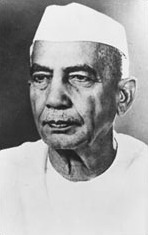
Chaudhary Charan Singh was an Indian politician and a freedom fighter who served as the 5th Prime Minister of India from 1979 to 1980 and the 3rd Deputy Prime Minister of India from January 1979 to July 1979. He served as 5th Chief Minister of Uttar Pradesh as a member of Bhartiya Kranti Dal. Charan Singh is known for his land and agricultural reform initiatives. He is widely regarded as the "Champion of farmers" after his life has been dedicated to advocating for the wellbeing and rights of farmers. He is the first leader outside the Indian National Congress who formed government in the northern India and became 5th chief minister of Uttar Pradesh.

The Communist Party of India (CPI) is the oldest communist party in India. The CPI was founded in modern-day Kanpur on 26 December 1925.
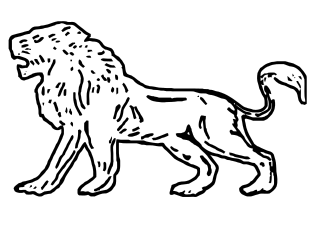
The All India Forward Bloc is a left-wing nationalist political party in India. It emerged as a faction within the Indian National Congress in 1939, led by Subhas Chandra Bose. The party re-established as an independent political party after the independence of India. It has its main stronghold in West Bengal. The party's current Secretary-General is G. Devarajan. Veteran Indian politicians Sarat Chandra Bose and Chitta Basu had been the stalwarts of the party in independent India.
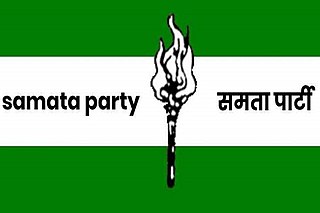
The Samata Party (SAP) is a political party in India, initially formed in 1994 by George Fernandes and Nitish Kumar, is now being led by Uday Mandal as its National President. Samata Party once launched Nitish Kumar as the Chief Minister of Bihar. It was an offshoot of the Janata Dal, with the alleged casteism of the parent party being the reason given for the split. The party has socialist leanings; at one point, it wielded considerable political and social influence in North India, particularly in Bihar. In 2003, most Samata Party members joined Janata Dal (United). Only a faction led by MP Brahmanand Mandal remained in the Samata party and continued to use the party name and symbols.
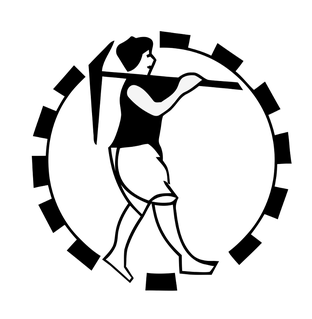
The Janata Party abbreviated JP, lit. People's Party) is an unrecognized political party in India. It was founded as an amalgam of Indian political parties opposed to the Emergency that was imposed between 1975 and 1977 by Prime Minister Indira Gandhi of the Indian National Congress. In the 1977 general election, the party defeated the Congress and Janata leader Morarji Desai became the first non-Congress prime minister in independent modern India's history.

Neelam Sanjiva Reddy was an Indian politician who served as the sixth president of India, serving from 1977 to 1982. Beginning a long political career with the Indian National Congress Party in the independence movement, he went on to hold several key offices in independent India – as Deputy Chief minister of Andhra state and the first chief minister of Andhra Pradesh, a two-time Speaker of the Lok Sabha and a Union Minister— before becoming the Indian president.
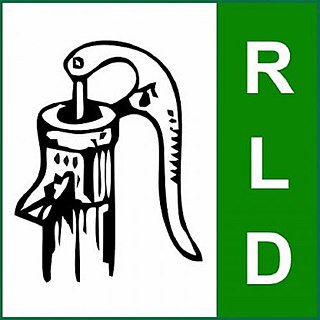
Rashtriya Lok Dal is an Indian regional political party in Uttar Pradesh and Rajasthan. It was founded by Chaudhary Ajit Singh, son of the former prime minister of India, Chaudhary Charan Singh in 1996 as a breakaway faction of the Janata Dal.
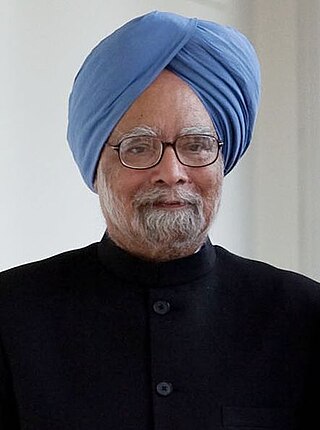
General elections were held in India in five phases between 16 April 2009 and 13 May 2009 to elect the members of the fifteenth Lok Sabha. With an electorate of 716 million, it was the largest democratic election in the world until being surpassed by the 2014 general election.
Bharatiya Kranti Dal was a political party in India, formed by the Uttar Pradesh Chief Minister Charan Singh. The party was founded at a meeting in Lucknow in October 1967. After the 1977 general election, the successor party of the BKD, Bharatiya Lok Dal was merged into the Janata Party.
Dravidian parties include an array of regional political parties in the state of Tamil Nadu, India, which trace their origins and ideologies either directly or indirectly to the Justice Party and the Dravidian movement of C. Natesanar and Periyar E. V. Ramasamy. The Dravidian movement was based on the linguistic divide in India, where most of the Northern Indian, Eastern Indian and Western Indian languages are classified as Indo-Aryan, whereas the South Indian languages are classified as Dravidian. Dravidian politics has developed by associating itself to the Dravidian community. The original goal of Dravidian politics was to achieve social equality, but it later championed the cause of ending the domination of North India over the politics and economy of the South Indian province known as Madras Presidency.

The 2004 Indian general election polls in Tamil Nadu were held for 39 seats in the state. The result was a victory for the Democratic Progressive Alliance, which included the United Progressive Alliance (UPA) and its allies the Left Front which won all 39 seats in the state. DMK and its allies were also able to hold on to Pondicherry, which has 1 seat, which allowed the UPA to win all 40 seats in Tamil Nadu and Pondicherry. The 2 larger partners Dravida Munnetra Kazhagam (DMK) (16) and Indian National Congress (INC) (10) won the majority of seats, with the junior partners Pattali Makkal Katchi (PMK) (5) and Marumaralarchi Dravida Munnetra Kazhagam (MDMK) (4) winning the rest. The remaining 4 seats were won by the Left Front parties. Due to the support of the Left Front for the government at the centre, all 39 seats in Tamil Nadu, supported the formation of the UPA-led government.
The All India Indira Congress (Tiwari) was a political party in India set up by dissident Indian National Congress party leaders Narayan Datt Tiwari, Arjun Singh, Natwar Singh, Rangarajan Kumaramangalam, Yashpal Arya and Sheila Dikshit. The party later merged with the Congress party when Sonia Gandhi took over the party.
Sathyavani Muthu was an Indian politician and an influential leader from Chennai, Tamil Nadu. She was a Member of the Legislative Assembly of Tamil Nadu, Rajya Sabha member and Union Minister. She began her political career as a member of Dravida Munnetra Kazhagam, began her own party, Thazhthapattor Munnetra Kazhagam and later joined the Anna Dravida Munnetra Kazhagam. In late 1990s, she again joined in DMK.

The Yuvajana Sramika Rythu Congress Party is an Indian regional political party based in the state of Andhra Pradesh. Its president, Y. S. Jagan Mohan Reddy, serves as the state's chief minister. It is currently the fifth largest party in the Lok Sabha with 17 seats.
The Left and Secular Alliance was a pre-poll alliance of political parties in the Indian state of Manipur. The alliance was formed ahead of the 2014 Indian general election by ten political parties as an alternative to the Bharatiya Janata Party (BJP) and the Indian National Congress (INC).

A Legislative Assembly election was held in Manipur on 4 March and 8 March 2017 to elect the 60 members of the Manipur Legislative Assembly, as the term of the previous Assembly was to end on 18 March 2017. Voter-verified paper audit trail (VVPAT) machines were used along with Electronic Voting Machines (EVMs) in four assembly constituencies in Manipur.

General elections are being held in India from 19 April to 1 June 2024 in seven phases, to elect 543 members of the Lok Sabha. The votes will be counted and the results will be declared on 4 June 2024.

Bharatiya Janata Party, West Bengal(Hindi: भारतीय जनता पार्टी, पश्चिम बंगाल), is the state unit of the Bharatiya Janata Party in the Indian state of West Bengal. The party's headquarters is located in Kolkata, the capital of the state. Sukanta Majumdar is currently appointed as the president of BJP West Bengal.














